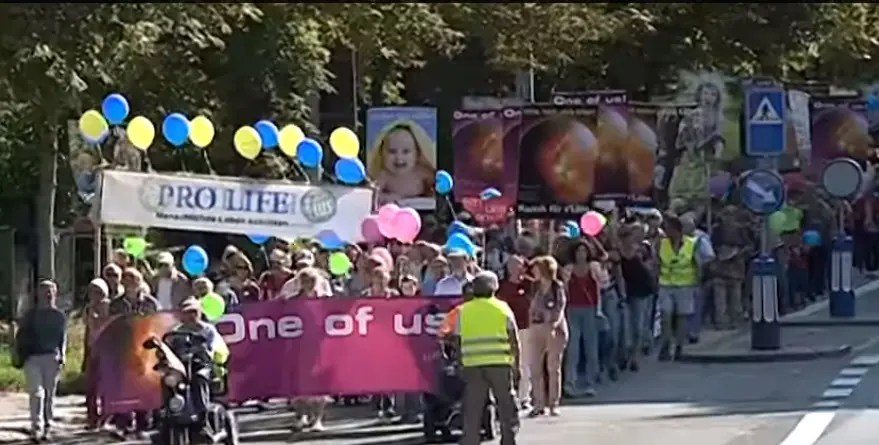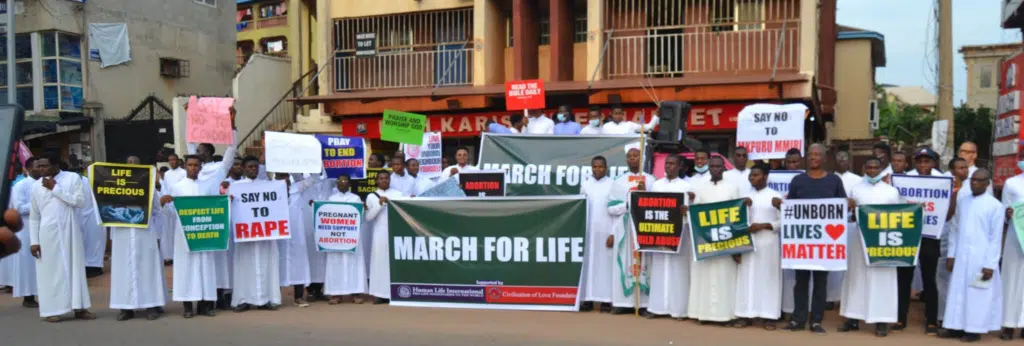Why We Must Actively Defend the Sacredness of Human Life

Last week in Spirit & Life, I wrote about the importance of giving witness in the public square to the intrinsic and incomparable value of human life in the womb. On Friday, January 24th, tens of thousands of pro-lifers from across the United States will gather at the National Mall in Washington, D.C. for the 52nd annual March for Life. Like those who will gather for similar marches and pro-life events throughout the country, participants will join in solidarity to give the preborn, the most vulnerable of our race, the voice they lack and need. And with unwavering dedication to the truth about human dignity, they will defend a moral vision of society that places the dignity of the individual human being, including the preborn child, at its very center.
Now that Roe is gone, some might ask whether the March for Life (or any march, walk, or rally for life across our nation) has outlived its purpose. Or, feeling disheartened by recently failed ballot initiatives and reports of a slight rise in the number of abortions, some might think the anti-life culture is expanding and question whether these public events are making a difference. And, of course, we always face the strong headwinds of moral and cultural confusion.
Against this backdrop, March for Life President Jeanne Mancini says we need to encourage pro-lifers and remind them “that we’re on the right side of history, that we’re in this for the long game, and that we need to lean in.” In other words, we cannot lose heart but remain undeterred in our efforts.
Every day, thousands of abortions are still taking place across the country; innocent human beings are being killed. This means that marches, walks, and rallies for life are as urgent as they ever were. They prompt us to more actively work toward a greater respect for the sacredness of human life from fertilization to natural death, as well as to pursue ways to protect human life in law, especially the preborn. And that means showing up, rain or shine, snow, sleet or hail or when threatened with persecution. That means educating ourselves, encouraging one another, and strategizing about how we can make a greater difference.
Without doubt, the March for Life and other pro-life rallies throughout the U.S. play fundamental roles in confronting as well as exposing the violence of abortion. They continue to provide a means for Americans to voice the need for and importance of reversing the mindset of abortion and the unjust laws that discriminate against the preborn.
They have become more than rallies calling for the end of abortion. They have become powerful symbolic manifestations of the strength and resolve of pro-life Americans, as well as a powerful tool for educating the next generation of pro-lifers and empowering them to go into their own communities to be instruments of influence and change.
Human Rights and Human Dignity
There are certain rights that are fundamental, and which can never be ignored. Preeminent is the inherent right to life, “the first among all rights and the condition for all other rights of the person” (Compendium of the Social Doctrine of the Church, no. 553). And though “Catholics may choose different ways to respond to compelling social problems,” say the U.S. Bishops, “we cannot differ on our moral obligation to help build a more just and peaceful world through morally acceptable means, so that the weak and vulnerable are protected and human rights and dignity are defended” (Forming Consciences for Faithful Citizenship, n. 20).
But not all social issues are morally or ethically equivalent, add the bishops:
The direct and intentional destruction of innocent human life from the moment of conception until natural death is always wrong and is not just one issue among many. It must always be opposed (no. 28).
Because we are dealing with human persons with inherent dignity, there is a corresponding duty owed to each person: to recognize, defend, and respect each person’s right to life, without exception. “In human society one man’s natural right gives rise to a corresponding duty in other men,” says Pope St. John XXIII. In other words, by virtue of being human we all have an equal right to life; therefore, having an equal right to life, we all have something in common that demands we also treat each other equally, including the preborn.
As Pope St. John XXIII continues to say,
…the duty, that is, of recognizing and respecting that right. Every basic human right draws its authoritative force from the natural law, which confers it and attaches to it its respective duty. Hence, to claim one’s rights and ignore one’s duties, or only half fulfill them, is like building a house with one hand and tearing it down with the other (no. 30).
Hence, duties reinforce rights, and they also set a limit on rights “because they point to the anthropological and ethical framework of which rights are a part,” says Pope Benedict XVI in Caritas in veritate. “Individual rights, when detached from a framework of duties which grants them their full meaning,” Benedict XVI states, “can run wild, leading to an escalation of demands which is effectively unlimited and indiscriminate” (no. 43). Simply put, a detached understanding of rights from a proper understanding of the human person and his nature can lead to a violation of human dignity, as we see with abortion, euthanasia, and human trafficking.

Catholic teaching asserts that human rights extend to the social structures that are needed for authentic human flourishing, which serve the common good. It also teaches that the reorientation of society and culture towards the respect of human life does not belong to a chosen few but “involves all members of society; no one is exempt from cooperating, according to each one’s possibilities, in attaining it and developing it” (Compendium of the Social Doctrine of the Church, no. 167). But sadly, we have not always lived up to our duty to defend human rights and responsibilities, and many Catholics, other Christians, and non-Christians remain silent in the face of the injustices perpetrated against human dignity.
As Catholic tradition teaches, human dignity can be protected, and a just and healthy community can be achieved only if human rights are protected and responsibilities are met. Only by exercising both our human rights and responsibilities can we protect the rights of all.
Call to Action
“Our defense of the innocent unborn needs to be clear, firm and passionate,” says Pope Francis, “for at stake is the dignity of a human life, which is always sacred and demands love for each person, regardless of his or her stage of development” (Gaudete et exsultate, no. 101).
The right to life is the first and most fundamental principle of human rights. Without acknowledging and defending the right to life, it is impossible to further the common good. History shows that protecting the rights of the most neglected or despised of human beings advances the interests of all human beings.
Respecting every life by banning abortion is not an infringement on freedom, but rather one step towards creating a more just society, with benefits for all. For unless the basic right to life is acknowledged and defended in law, freedom’s foundations are gravely weakened as “society becomes a mass of individuals … without any mutual bonds” (Evangelium vitae, no. 57).

The proper understanding of inviolable human dignity is the foundation of a moral society. And this inviolable dignity “is to be respected in all circumstances, not because that dignity is something we have invented or imagined,” says Pope Francis, “but because human beings possess an intrinsic worth superior to that of material objects and contingent situations” (Fratelli tutti, no. 213). For this reason, Catholics actively work to advance a world where every human life is respected and defended, promoting true justice and peace.
The pro-abortion and anti-life movement has been successful in its propagandistic messaging, which has convinced many people that the preborn child is not human and therefore not deserving of protection. Though we know that this message is a grotesque lie, and that the humanity of the preborn child is one of the most basic biological facts, a majority in society no longer believe that every human life is sacred and that all human lives are equally sacred. Hence, “the right to life itself is not fully protected, especially for unborn children”(Forming Consciences for Faithful Citizenship, no 2).
As we get close to the National @March_for_Life on Friday, here's a throwback to Nigeria's march for life in 2022! pic.twitter.com/EYCRVjPA9s
— Human Life Intnl (@HumanLifeIntnl) January 22, 2025
Unfortunately, human beings are often inconsistent and are blinded by their prejudices and selfish desires. Much of the Christian West has carved out certain systemic “exceptions” to the dignity of the human person—escaping the duty of respect owed to other persons, often by simply denying that the other is a person to begin with. The primary victim of this movement has been the preborn child, although it is increasingly extending to the disabled, sick, and elderly.
Seek Conversion and Transformation
Precisely for this reason, we need Catholics and other people of good will to seek the conversion and transformation of our nation (and world) and its culture regarding human dignity. And since not all threats to human life are equally severe, and because of the immediate and imminent danger, it requires unique resources to combat the anti-life mentality by resensitizing society to the rights and duties owed to human persons.
These marches, rallies, and pro-life events have morphed into something far bigger than a protest against abortion. They have become a compelling expression of the pro-life movement’s deep longing for a more just society based upon the inalienable dignity of human life. Until we have such a society, we must stand in truth proclaiming the incomparable value of human life, being the voice of the defenseless in the public square: “United [in an] ethical effort to activate a great campaign in support of life” (Evangelium vitae, no. 95).

Until this vision is fully realized and defended, our work continues. We won’t give up until every human being’s right to life is respected in law and in society.
Please join me in praying for pro-lifers with Father Paul Marx, OSB, Founder of Human Life International.
O God, the Father and Creator of human life, help us never to become discouraged in defending the full breadth of that most precious gift, from the miracle of fertilization to the spiritual serenity of natural death.
Inspire us to remember that without You, we are powerless, and that what we do for the least, especially the helpless unborn dearest to You, we are actually doing for Your Son, who lives and works in and through us.
Protect us against the wiles and wickedness of the devil, a “murderer and a liar from the beginning.” May the Holy Spirit enlighten us along the way!
Amen


We will be praying with you not only for the unborn but for peace and unity in our One Holy Catholic and Apostolic Church so that we can once again be a United powerfully strong voice in a world in much need of this so that it’s impact can be felt once again.